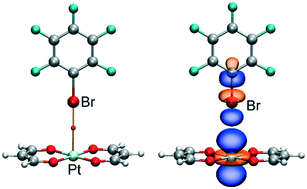On the energetic stability of halogen bonds involving metals: implications in crystal engineering†
Abstract
This work reports a combined computational and experimental analysis of the ability of square planar d8 transition metal complexes to establish unconventional halogen bonding interactions with chloro-, bromo-, and iodopentafluorobenzene as σ-hole donors. Typical M⋯Ha (M = transition metal and Ha = halogen) interactions are coordination bonds (frequently halides acting as counter ions) or semicoordination bonds (neutral lone pair donor halogens). However, in recent times a new binding mode has been described in the literature with a reverse donor–acceptor role. That is, directional C–Br,I⋯M halogen bonding (HaB) interactions have been reported where the metal center acts as the electron-rich atom and the halogen atom acts as the acceptor via its σ-hole. In addition to the Cambridge Structural Database (CSD) survey of exemplifying X-ray structures, this manuscript reports a DFT study that investigates the relative ability of Ni, Pd, and Pt square planar complexes to participate in HaBs with chloro-, bromo-, and iodopentafluorobenzene.

- This article is part of the themed collection: Introducing the CrystEngComm Advisory Board and their research


 Please wait while we load your content...
Please wait while we load your content...